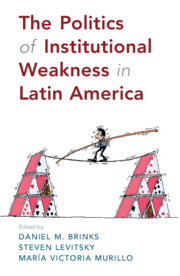Book contents
- The Politics of Institutional Weakness in Latin America
- The Politics of Institutional Weakness in Latin America
- Copyright page
- Contents
- Figures
- Maps
- Tables
- Contributors
- Acknowledgments
- 1 The Political Origins of Institutional Weakness
- 2 When (Electoral) Opportunity Knocks
- 3 The Stickiness of “Bad” Institutions
- 4 Presidential Crises in Latin America
- 5 Coercion Gaps
- 6 Aspirational Laws as Weak Institutions
- 7 The Social Determinants of Enforcement
- 8 A Multilevel Approach to Enforcement
- 9 What/Whose Property Rights?
- 10 Imported Institutions
- 11 Social Origins of Institutional Strength
- 12 Conclusion
- Bibliography
- Index
10 - Imported Institutions
Boon or Bane in the Developing World?
Published online by Cambridge University Press: 06 May 2020
- The Politics of Institutional Weakness in Latin America
- The Politics of Institutional Weakness in Latin America
- Copyright page
- Contents
- Figures
- Maps
- Tables
- Contributors
- Acknowledgments
- 1 The Political Origins of Institutional Weakness
- 2 When (Electoral) Opportunity Knocks
- 3 The Stickiness of “Bad” Institutions
- 4 Presidential Crises in Latin America
- 5 Coercion Gaps
- 6 Aspirational Laws as Weak Institutions
- 7 The Social Determinants of Enforcement
- 8 A Multilevel Approach to Enforcement
- 9 What/Whose Property Rights?
- 10 Imported Institutions
- 11 Social Origins of Institutional Strength
- 12 Conclusion
- Bibliography
- Index
Summary
A substantial body of literature holds that imported institutions are innately inferior to their indigenous counterparts (Evans 2004; Rodrik 2007; Weyland 2009; Stiglitz 2013), and developing country civil service laws have frequently been invoked by way of example. Civil service laws that are adopted at the behest of foreign powers are at best likely to go unenforced, the literature implies, and at worst likely to insulate not the “specially trained officials” (Gerth and Mills 1946: 370) anticipated by Max Weber but their ill-qualified predecessors (Shepherd 2003; Longo 2005; Schuster 2012).
Are imported institutions really likely to bomb or backfire in this way? I address the question by examining data on the recruitment and management of the inspectors responsible for the enforcement of labor and employment law in the Dominican Republic (DR) and find no cause for concern.
- Type
- Chapter
- Information
- The Politics of Institutional Weakness in Latin America , pp. 235 - 252Publisher: Cambridge University PressPrint publication year: 2020
- 2
- Cited by



